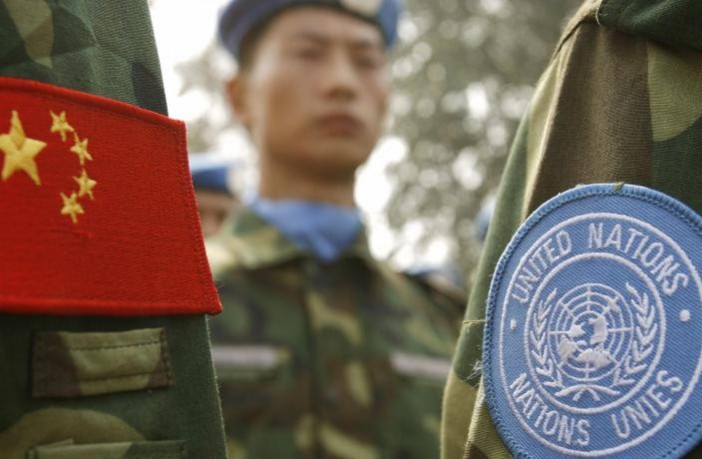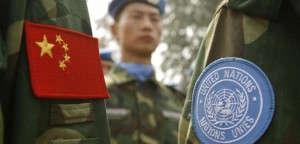Foreign Policy
by Colum Lynch
As China steps up its commitment to U.N. peacekeeping, Beijing is said to be eyeing a leadership role — with potentially troubling human rights implications.
China is believed to have its sights on the United Nations’ top peacekeeping job, a position that would place a country with an abysmal human rights record in charge of the world’s
second-largest expeditionary force of more than 100,000 peacekeepers deployed in hot spots around the world.
While the race for a new U.N. secretary-general has for months grabbed most of the attention at Turtle Bay, behind the scenes a fierce political competition is underway to land top posts under the world body’s next chief. The outcome could shatter the monopoly that Western powers have held for decades inside the inner sanctum of U.N. leadership — and push peacekeeping operations in a direction human rights advocates may find worrisome.
According to multiple U.N.-based officials, Beijing is angling to run the Department of Peacekeeping Operations, or DPKO, which has been headed by French nationals for nearly 20 years. Moscow, for its part, is said to be hankering after the Department of Political Affairs, or DPA, which former U.S. State Department officials have headed for the past decade.“China is making a play for DPKO, and Russia is making a play for DPA,” one senior U.N. official said.
“Are these just opening positions? Who knows.”Beijing’s apparent interest in running global peacekeeping operations dovetails with its increasing evolution toward a more interventionist approach in international affairs. But it could also herald a troubling shift in how U.N. peacekeeping operations are conducted, with a lesser emphasis on human rights and discipline, at a time when the U.N. blue helmets face accusations of sexual abuse in the Central African Republic and of failing to protect persecuted civilians and aid workers in South Sudan.
“The Chinese are laying down a marker,” said Richard Gowan, a peacekeeping expert at the European Council on Foreign Relations.“We’re seeing the first phase of a Chinese bid to, firstly, assert itself over U.N. peacekeeping and, secondly, to rewrite the rules of U.N. peacekeeping.”China certainly has skin in the game. Operating under U.N. auspices, China has deployed 2,639 peacekeepers on 11 missions — more than all the other permanent members of the Security Council combined.
And China just became the second-largest funder of U.N. peacekeeping operations after the United States, chipping in more than 10 percent of the nearly $8 billion annual budget.At a September 2015 peacekeeping summit hosted by President Barack Obama, Chinese President Xi Jinping pledged to place 8,000 troops at the disposal of a U.N. standby force. China also promised to train 2,000 foreign peacekeepers and committed to spending $100 million for African Union stability forces.“Considering that China contributes more troops to the United Nations than the other permanent four members put together, that they are No. 2 after the United States in terms of contributions to the peacekeeping budget, one wonders, ‘Why wouldn’t they want DPKO?’” a second senior U.N. official said.
But with that financial muscle comes influence: Chinese diplomats have recently tried to scale back the budget for promoting human rights in peacekeeping duty stations, nominally to save money, U.N. diplomats say.Like China, Russia’s interest in snagging a top U.N. post reflects its own return to great-power ambitions — and chafing at what both countries see as a rigged appointment system that favors the Western powers.The United States, Britain, and France have held a lock on the most influential positions in the U.N. Secretariat since the end of the Cold War.
Hervé Ladsous, a former diplomat, is the fourth French national to run the U.N. peacekeeping department. Stephen O’Brien, once a member of parliament for the Conservative Party, is the third British national to run the U.N. principal emergency relief agency.Jeffrey Feltman, a former U.S. assistant secretary of state for Near Eastern affairs, is the second American in more than nine years to serve as the U.N.’s top political advisor.
Before that, the United States ran the U.N. Department of Management since the end of the Cold War. That post is now held by a former diplomat from Japan, a close American ally.The near-monopoly on top jobs has rankled U.N. reformers who say such posts should be selected primarily on the basis of merit and not on nationality. The current system — in which big powers pressure the U.N. chief to fill his cabinet with their political appointees — undermines the U.N. leader’s independence, they say.
It also flies in the face of the U.N. Charter, which expressly forbids U.N. civil servants from seeking or receiving “instructions from any government or from any other authority external to the Organization.”In 1992, the U.N. General Assembly went further, explicitly stating that there should be “no monopoly on senior posts by nationals of any State or group of States.”But U.N. secretary-generals have found the big-power appeals hard to resist. During his first run for secretary-general in 1996, Kofi Annan faced the repeated threat of a French veto, which was lifted after Paris secured a commitment to place a French national in the top peacekeeping job.
The five veto-wielding powers will expect top jobs in any new secretary-general’s cabinet.The informal practice of the U.N. Security Council’s permanent five members “conditioning their support for a candidate for secretary-general on the candidate’s willingness to secretly agree to appoint their nationals to key positions is a scandalous violation of the U.N. Charter,” said Bill Pace, the head of the World Federalist Movement-Institute for Global Policy, which has championed efforts to reform the selection process for U.N. secretary-general.
And China and Russia are increasingly speaking out against what they see as blackballing. At a luncheon last month for Secretary-General Ban Ki-moon and the permanent five, Russian Foreign Minister Sergei Lavrov protested that his government was the only one of the five that didn’t have an undersecretary-general posting at U.N. headquarters, according to a senior U.N.-based diplomat.The United States, Lavrov added, shouldn’t hold a monopoly over the DPA, the U.N.’s top political job.
Another official said Russia has pressed for a rotation that would give it a shot at that job.Russia hasn’t been entirely stiffed. Russian diplomats ran the U.N. headquarters in Geneva for nearly 20 years, from 1993 through 2011, a post that carries the rank of undersecretary-general. Yuri Fedotov, a former Russian diplomat, currently heads the U.N. Office on Drugs and Crime, based in Vienna. But neither of those posts wield the same kind of influence over world affairs as the senior political, security, or humanitarian relief jobs in New York.
But perhaps no permanent member of the Security Council has felt more aggrieved than China, a major world power that believes it has gotten short shrift. Its most senior post is the Department of Economic and Social Affairs, considered a second-tier U.N. agency.Now, having gradually expanded its presence in peacekeeping missions over the past decade, China believes it deserves an upgrade, some diplomats say.Most of China’s blue helmets are posted in Africa, where Beijing maintains extensive commercial, political, and security interests. It has troops in Mali, Liberia, the Democratic Republic of the Congo, and South Sudan.Three Chinese peacekeepers have died on duty this year. Islamists killed one Chinese soldier and injured four others in an ambush in Gao, Mali, in May.
Two Chinese soldiers were killed in South Sudan in July, when their armored vehicle was hit with a rocket-propelled grenade.China has also spent eight years running counterpiracy naval patrols off the coast of Somalia, helping end what for many years was a costly scourge to global trade. And it has more recently established a naval base in Djibouti, alongside the United States and other world powers.Not everyone is convinced that China is keen to take on a high-profile role, saying all this talk of Chinese aspirations has been fueled by backroom gossip.
The Chinese Mission to the United Nations did not respond to a request for comment; nor did several secretary general candidates.One candidate who did respond acknowledged being told China was angling for the top peacekeeping job by “various sources, including fellow UN secretary general candidates.” But the candidate, who spoke on condition of anonymity, added: “I must admit that the Chinese themselves have not raised that with me.”
“This rumor about China seeking [an undersecretary general] position for peacekeeping? Personally, I don’t buy it,” said one Security Council diplomat, noting that he believes China recognizes it is not ready for prime time.Peacekeeping mandates historically have been fashioned by the Security Council’s Western powers, placing any Chinese peacekeeping chief in the awkward position of carrying out instructions that may conflict with Beijing’s objectives.
And any new scandal that erupts under China’s watch could reflect badly on Beijing.Already, Chinese troops, along with their Nepalese and Ethiopian counterparts, have faced criticism for failing to come to the aid of relief workers beaten and raped in a horrifying attackby South Sudanese government troops in July at the Terrain hotel facility in Juba. One senior European diplomat said it’s more likely that Beijing is after a lower-profile post within the U.N. Secretariat, such as senior military advisor, which would give it greater influence within the U.N.’s internal debates over peacekeeping doctrine.
Still, China’s embrace of peacekeeping operations has been a watershed for a country with a deeply entrenched resistance to foreign intervention. Even today, China remains wary of U.S.-backed efforts to push U.N. blue helmets to act more aggressively to protect civilians in conflict areas.China’s trepidation about U.N. peacekeeping dates to the very beginnings of the People’s Republic. In the Korean War, from 1950 to 1953, a U.N.-mandated force led by the United States marched almost to the Yalu River before clashing with Chinese troops. The U.S. commander, Gen. Douglas MacArthur, even considered a nuclear strike to deter Mao Zedong’s Red Army from pouring down into North Korea.Twenty years later, the scars remained. When China joined the United Nations in 1971, it refused to fund U.N. peacekeeping operations for a decade and remained wary of engaging in council discussions on the topic.By the 1990s, as China’s more open approach to the world paid economic dividends, it has become less ambivalent.
In recent years, it has stationed force commanders in Western Sahara and Cyprus. Currently, two Chinese officers serve as military advisors in the U.N. peacekeeping department at the headquarters in New York. The second-highest-ranking military officer in the U.N. mission in South Sudan, Maj. Gen. Yang Chaoying, is Chinese.There is cause for concern China could alter the way U.N. peacekeeping operations work. In the past, China typically sided with the U.N.’s developing countries, which were thrilled with fat budgets that employed thousands of their citizens. But as China’s share of the peacekeeping budget has grown, Beijing suddenly started promoting greater fiscal restraint.In June, Chinese diplomats fought hard to keep costs down by trying to cut funding to human rights offices embedded in most peacekeeping missions.
They also proposed defunding the department’s “conduct and discipline” unit, which monitors reports on abuses by U.N. soldiers.They also tried to scale back funding for the surveillance drones the U.N. uses in peacekeeping missions from Congo to Mali, which track the movements of potential enemies in the field.The United States and its Western allies beat back most of China’s proposals. But diplomats expect this may be the beginning of a long-term effort by Beijing to flex its growing fiscal muscles and constrain U.N. blue helmets from scrutinizing countries’ human rights abuses.“They seem to be in favor of streamlining the budget,” the council member said.“But that’s more of a talking point to hide what they really had in mind: scrapping all the different expenses proposed for human rights,” the diplomat said.
Photo credit: PETER PARKS/AFP/Getty Images








